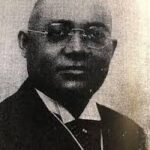ZANGINA, MUHAMMAD
- 2 Min Read
Muhammed Zangina was the Ya Na (paramount chief) of Dagomba in what is now, northeastern Ghana in about the early 18th century. During his reign far-reaching changes occurred in the position of Islam in Dagomba, changes that were so significant that there is a tendency among Muslim writers to regard him as the founder and first Ya Na of Dagomba. He was, however, in fact the 16th ruler, and was the fourth in succession to his father, Ya Na Tutugri.
He was born a non-Muslim, and his pre-Islamic name is said to have been Wumbei. As a youth, he is said to have spent some time in Hausa country (in what is now northern Nigeria and the Niger Republic), and he subsequently encouraged the immigration of Hausa mallams (clerics) and artisans to Dagomba. It was from these artisans that the Dagomba learned the arts of weaving and blacksmithing. The most notable Hausa immigrant was Muhammad al-Kashnawi, who converted Wumbei to Islam, renaming him Muhammad Zangina, the name “Zangina” being either a Hausa expression of doubtful etymology, or a corruption of “Dangana,” meaning “he who resigned himself to God.”
He created a number of imamships (appointments as leaders of ritual prayers) and other Muslim offices which were subsequently incorporated into the socio-political system of Dagomba. During his reign, pre-Islamic festivals gave way to, or were merged with, Islamic ones, and Muslims, whether Dagomba (Dagbamba) or strangers, were permitted to follow the Maliki School of Law (named after Malik Ibn Anas, the 8th-century author of the Muwatta the first written compendium of Islamic law), rather than customary practice in matters of marriage, divorce, and inheritance.
Following a successful Gonja invasion of western Dagomba in about 1713, Muhammad Zangina relinquished the “skin” (the equivalent of the throne) of Dagomba to his cousin, Andani Sigli. The date of his death is not known, but he was buried at Agbandi, where he apparently settled after his abdication.
Muhammad Zangina reigned for a relatively short period, but the advance which Islam made in Dagomba under his rule was so marked that although his successors showed varying degrees of personal attachment to Islam, and continued to observe many pre-Islamic festivals, none of them attempted to reduce the status of Islam in Dagomba to what it had been before his reign.
A. ILIASI



